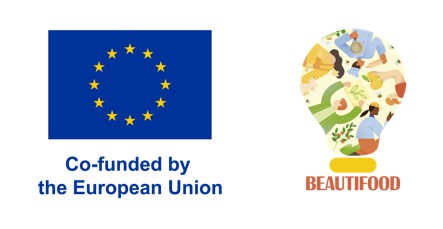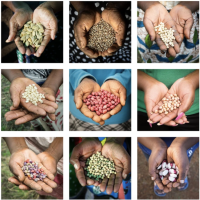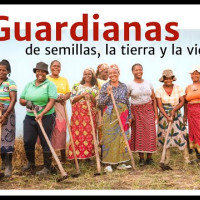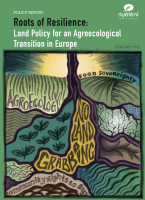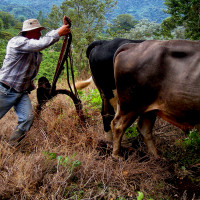Rooting Deeper Through Agroecology
Temas
The Rooting Deeper Festival was organized on 30 and 31 May in Ede, in the countryside in the east of the Netherlands to share the story and values of agroecology with the general public in a way anyone could enjoy. Agroecology is a science, a set of practices, and a movement that is critical to the transition to sustainable food systems. The festival featured guided excursions to local agroecological initiatives on the first day, followed by a second day with market stalls, interactive workshops, live performances, and meals from local vendors. The following blog gives an impression of the festival.
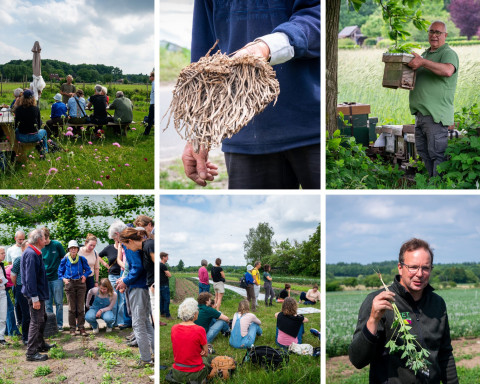
Excursions to agroecological initiatives
Four bicycle excursions took place on the first day of the festival.
The first excursion was called ‘Biodiverse Grains in an Ancient Cultural Landscape’. This tour explored the connection between biodiversity, culture, and agriculture. At Graangeluk, Marcel van Silfhout introduced Dutch heritage grains like emmer, cultivated with native herbs on historic fields. The tour continued to Windmill de Vlijt for a guided tour and a chance to climb the windmill. The final stop was at Stadsbrouwerij Wageningen, where participants toured the brewery and sampled beers made from local grains.
The second excursion was titled ‘Collaborating pioneers on the Wageningse Eng’. This excursion began at the Oude Ronde farm where Han te Ronde shared knowledge on the cultivation of asparagus. Next, a beekeeper joined to share insights into the state of the bees, his products, and his collaboration with Han. The following stop was at EET Wageningen, where a farmer explained how he grows grains and lupine in partnership with Han, alongside his strip farming of vegetables. The day concluded with a drink with Klaas at the Netherlands’ first sel f-harvest garden: De Nieuwe Ronde.
The third excursion, titled ‘Access to Land and Care at Gardens in Former Peatlands’, began at the no-dig Tuinderij Lichtveen in the Binnenveld of Bennekom. There, Chris and Pauline spoke about the challenges young farmers face in securing land, and how they addressed this by partnering with an organic livestock farmer. They also explained their no-plow growing method and how they established outlets through restaurants and markets. While they continued working after the tour, participants stayed a bit longer to connect with Barbara from the Barbarian Theater, who shared stories of the peatland. A short bike ride through the scenic Binnenveld brought us to the volunteer-run Creative Garden, full of experiments, and finally to the organic care farm De Hoge Born, with its farm store.
The fourth excursion was titled ‘Abundance and Spirit in a Forest Garden’. It began at the Ommuurde Tuin in Renkum, King William III’s beautiful historic vegetable garden, where founder and gardener Esther Kuiler guided us through a space containing as many as 400 plant species. Esther showed how Druidism, a pagan nature spirituality, is reflected in both the garden’s design and her approach to gardening. For the final stop, we cycled to a sacred site in the woods, where we connected with the creek.
A day of exchange
The second day of the festival featured a variety of activities, including a market, live performances, interactive workshops, and food from local vendors.
Kids’ program
The kids’ program included various workshops and activities. First, there was a creative storytelling and art workshop for children, where participants explored the forest, imagined the dreams of woodland creatures, and brought them to life through clay. Then, a seed bomb making workshop invited participants to create seed bombs, on the fitting location of the old military barracks in Ede, sowing seeds for peace and life. Sourdough making took place by the fireplace, where participants prepared dough and baked bread over the open fire, while others on the terrace experimented with blowing the biggest, most beautiful bubbles.
Musical performances
Seven diverse musical performances took place on the main stage:
- Klimaatkoor Nederland opened the main stage with polyphonic, disarming climate songs that aimed to raise awareness and mobilize people around environmental concerns.
- Anima Jhagroe-Ruissen and Shivant Jhagroe performed an experimental act bledning dance, music, and henna. They explored how to stay resilient in times of overt racism and planetary plunder and reimaged worlds beyond resistance.
- Mauritanian rapper and human rights defender Yero Gaynaako delivered razor-sharp lyrics in Fulani about the struggles of his people, with a performance, alongside James, that bridged activism and music.
- Chihiro Geuzebroek and Radical Friends performed protest songs for climate justice.
- Zarjanka performed traditional polyphonic folk songs, treaditionally improvised by farmers, from various groups in Russia, Ukraine, and Belarus.
- Weyu honored ancestral connection, love and harmony through culture, sun energy, and the power of togetherness.
- Global Contradiction closed the festival out by mixing struggle songs with political hip-hop, popular classics and Latin grooves that made the crowd dance.
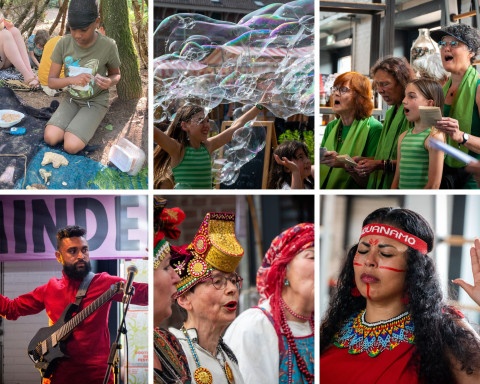
Market stalls
The market was full with ten stalls, offering everything from products by local agroecological farmers and local honey, to a buddy program for newcomers with refugee backgrounds, and even a screen printing station.
Interactive knowledge exchange workshops
Fourteen diverse workshops were held throughout the festival, covering topics from sustainable farming techniques to activism to seed sovereignty.
Esther Kuiler from Ommuurde Tuin in Renkum, shared how to make and use Bokashi, a fermented compost technique. Weibe from XR Agriculture hosted an interactive meet and greet to explain how to start with activism. Workshops on fermentation were given by Nihal Rabbani of Culture Grub and Christiaan Weij of Proeftuin Ede, teaching participants how to ferment their own vegetables at home.
Eliane Bakker and Chip of Toekomstboeren gave a workshop on what Ede would look like if land was managed as a commons. In their workshop, they delved into the agroecological vision of land as a living system and a common good. Participants reflected on questions such as: Can land belong to itself? Or to a community that lives off of it? What does it mean to share the Earth, rather than own it?
In another workshop, Ida Simonsen of Toekomstboeren, Sterre of Reclaim the Seeds, and Shaun of the Transnational Institute (TNI) led an interactive session on strengthening advocacy to protect seed diversity and local food cultures in the Netherlands and globally. The workshop was accompanied by the photo exhibition Seed Guardians of Southern Africa of the Rural Women’s Assembly and supported by TNI and partners.
Arjan Smits from the Federatie van Agroecologische Boeren presented the principles and practices of biocyclic vegan agriculture, an animal-free form of organic agriculture that excludes animal-based inputs. Eduardo Caceres and Janneke Bruil from the Agroecologie Netwerk and the Stroomgebied Zuid-Veluwe explored how we can work towards regional food systems and cultures of care, sharing insights from Amsterdam, Friesland, and the Zuid-Veluwe region. In a hands-on workshop, Holly Bartley of Re-PEAT and Edu Hernandez of Toekomstboeren taught participants the importance of peatlands and the impact of peat use in horticulture. Participants mixed their own peat-free soil and learned cultivation techniques.
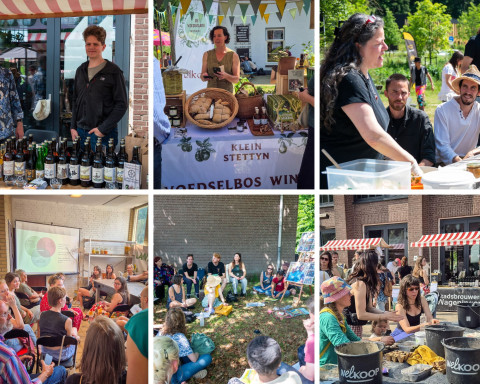
Ania Ektate of Otherwise led a reflective workshop on what it means to build reciprocal relationships, focusing on the more-than-human world. The workshop focused on the question: what does it look like to cultivate, and celebrate, relationships of reciprocity? Stijn Kluck of the Agroecologie Netwerk hosted a workshop on organizing for dignity and justice with agricultural labour migrants. They shared their experience in organising against the exploitation of migrant agricultural workers in the Netherlands, with two speakers who brought lived experience. A workshop on Growing the Agroecological Movement in Europe shared experiences on building coalitions to promote agroecology, access to land, and community supported agriculture. Speakers included Paula Gioia of ABL and ECVC, Germany; Petra Tas of De Landgenoten and the European Access to Land Network, Flanders; and Ariane Richardot of AMAP and Urgenci, France, and was facilitated by Sylvia Kay of the Transnational Institute.
A workshop given by Alex and Sage of ASEED discussed the role of agroecology and farmers in resisting right wing extremism and politics. Tobia Jones and Lina Bravo Mora dove into the deep connection between soil, water, history, thinking and words with participants by interacting with clay from the Lutkemeer polder. Alex from Boerengroep guided participants through "Everyone Can Be a Changemaker", a workshop combining physical exercises, art making, visualization and story sharing, to help participants connect, tap into their power, and explore their role in creating societal change. Finally, permaculture and food forest pioneer Malika Cieremans from Circle Ecology led an outdoor workshop on how to eat tasty and healthy food from your own garden, neighborhood, or farm.
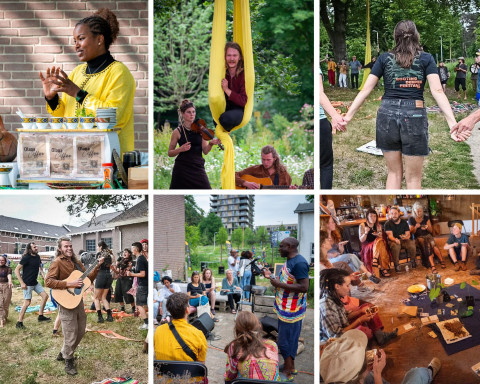
Other performances & storytelling
An Ethiopian coffee ceremony took place, freshly toasting, grinding and brewing coffee for participants, while about the story behind the coffee and its drinkers was shared.
In a theatre performance, the Forest Theater Collective and Compagnie Entropie used music, theater, and acrobatic spectacle to explore questions of succession, sustainability, and the future of farming.
Several storytellers captivated listeners by the fireplace with storytelling by De Verhalenvanger, De Barbaar and Vinije Haabo.
During a cooking performance, sound artist Kristina Mau Hansen and agroecological gardener Helen de Bruijn, took participants on a new culinary adventure. Through re-imagining a traditional Dutch bean recipe, the duo let the audience experience the story of this bean through deep listening, tasting, and dialogue.
A desire for change
We conducted a survey amongst the festival visitors to gather their opinion on the desired future of the Dutch food system. We collected a total of 51 surveys, the responses can be seen below in Figure 1.
The following questions were asked in the survey:
1. The Dutch food system is sustainable in terms of: a. Impact on the environment; b. Consideration of animal welfare; c. Respect for farmers and agricultural workers' rights, including support for fair incomes and wages.
2. I find it important that there are more agroecological farms in my region and that local authorities prioritise agroecological producers through e.g. agricultural subsidies and facilitating access to land.
3. Public institutions should be required to prioritise the procurement of agroecologically produced food in their canteens (for example in schools, hospitals and care homes).
4. The advertising of junk food (ultra-processed foods rich in salt, sugar and fat) should be banned.
5. I can afford and have access to healthy and sustainable food.
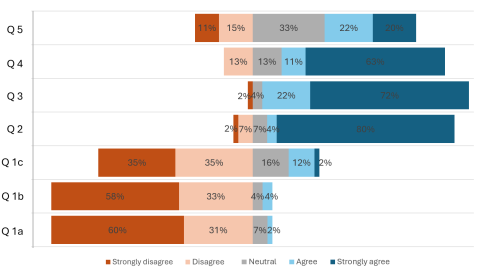
The results of the survey show that most participants agree the Dutch food system is not sustainable in terms of: impact on the environment, consideration of animal welfare, or respect for farmers and agricultural workers' rights. A strong majority supported promoting agroecology, both by sourcing food for public institutions from agroecological farms and by prioritizing agroecolgical farms in policy-making. Most respondents also favored banning junk food advertising, with only 13% in disagreement. Question five, which addressed the affordability and accessibility of healthy and sustainable food, had the most varied responses, showing a broad distribution across all answer options. Twenty-six percent of respondents answered that they do not have access to healthy and sustainable food, while 42% stated they do.
The survey included two open-ended questions, “If you could change one thing about your city or region’s food system, what would it be?” and “What does ‘rooting deeper’ in your region mean to you?”
In response to the first question, many respondents called for less production of animal products and more production and promotion of vegan products; greater availability and production of local, sustainable, and healthy food; less industrial monocultures and more agroecological farms; and to raise public awareness and transparency around food origins, health, and sustainability.
Responses to the second question highlighted the importance of local food production, being an active member of your local community, strong social connections with local people and food producers, and connecting to and taking care of the land and soil in your region.
Based on the survey responses and inputs from the workshops, some of the strengths, weaknesses, opportunities, and threats facing the agroecology movement are identified:
| Strengths | Weaknesses |
|
|
| Opportunities | Threats |
|
|
These inputs will be used in a dialogue with Dutch policymakers to be organized later in the year in a continuation of the BEAUTIFOOD project.
